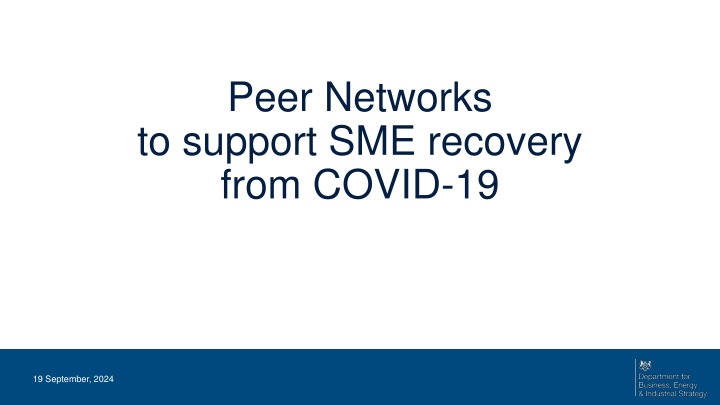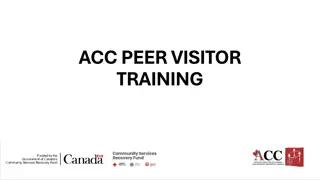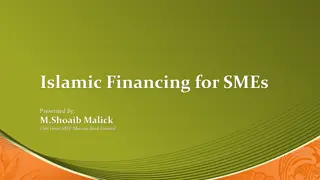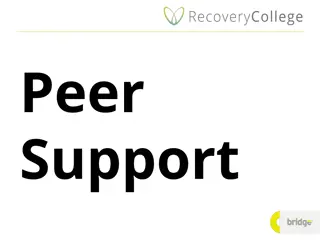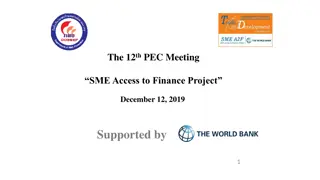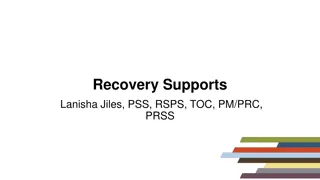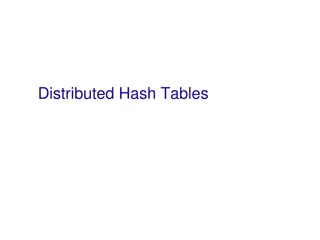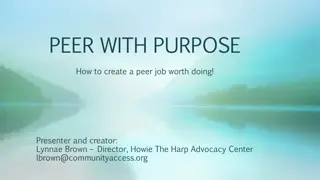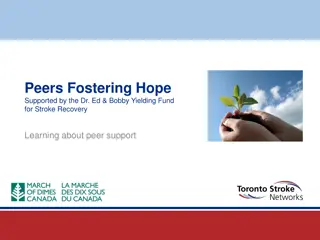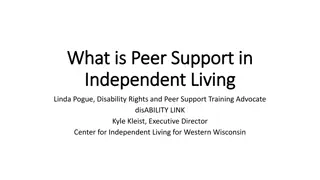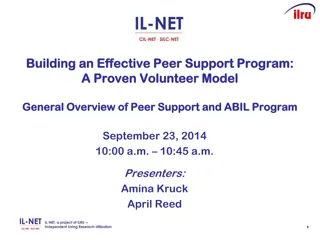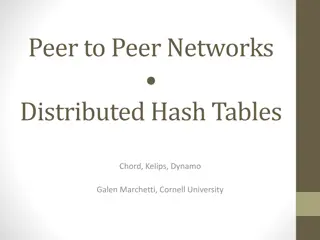Supporting SME Recovery Through Peer Networks
The Business Productivity Review highlights the benefits of formal management practices and external advice for SME success. Peer networks with trained facilitators can enhance productivity and problem-solving capabilities. BEIS advocates for virtual peer learning during COVID-19, transitioning to face-to-face sessions when feasible. Action Learning Sets in Peer Networks focus on addressing COVID-19 challenges through group discussion and tangible solutions.
Download Presentation

Please find below an Image/Link to download the presentation.
The content on the website is provided AS IS for your information and personal use only. It may not be sold, licensed, or shared on other websites without obtaining consent from the author.If you encounter any issues during the download, it is possible that the publisher has removed the file from their server.
You are allowed to download the files provided on this website for personal or commercial use, subject to the condition that they are used lawfully. All files are the property of their respective owners.
The content on the website is provided AS IS for your information and personal use only. It may not be sold, licensed, or shared on other websites without obtaining consent from the author.
E N D
Presentation Transcript
Peer Networks to support SME recovery from COVID-19 19 September, 2024
Peer Networks Background The Business Productivity Review found that those businesses that adopt formal management practices are more likely to achieve higher turnover, employment and productivity growth. Businesses that seek external advice or undertake formal training are more likely to improve their performance. Whilst there is a large private sector market for advice and training, SMEs report issues with a lack of awareness of the help available and a lack of trust in the quality of provision. Evidence to the review provided by the OECD supports previous findings that businesses prefer to take advice from trusted sources, including as their peers, particularly when presented with external challenges and opportunities. Evidence indicates that Peer Networks can result in 2.5% higher labour productivity (PLATO). The importance of investing in Peer Networks now The first place most businesses turn to for advice on how to overcome a challenge or get new ideas is others within the business world. Businesses want to hear from trusted sources and peers that look and feel like them (e.g. similar challenges, size, industry etc) and have successfully navigated the challenge they face. This is particularly true for businesses facing a trigger point, such as COVID-19. Intelligence gathered from an extensive range of external stakeholders have indicated that there is unmet demand for peer to peer support. Whilst the long term objective of these initiatives is to drive up productivity and help close the gap with our competitors, this is exactly the support businesses need now to develop the skills to tackle issues they face in relation to COVID-19. As these networks will continue at least to end March it is expected that they will be useful in preparing SMEs for the end of the transition period.
What does BEIS mean by Peer Networks? In this context peer networks are groups in which peers come together with the support of a trained facilitator to discuss challenges and identify workable solutions. Relationships of trust will be essential for success. Evidence demonstrates that peer learning is most effective with the support of a trained facilitator using an action learning style. Action learning is a process in which a real-life problem is worked through with a group that promotes enquiry and reflection, and which results in tangible actions or solutions. How does BEIS see this working? Given COVID-19 restrictions, sessions would need to be delivered virtually, but should move to face to face as soon as was feasible, subject to demand for this approach. In order to learn from existing best practice BEIS will work with LEPs and delivery partners and existing networking organisations to develop a Playbook a practical how to toolkit to support them and facilitators in implementing new local groups. Delivery can be outsourced by LEPs to existing networks or delivery partners.
Action Learning Sets (ALSs) Action learning is a process in which a real-life problem is worked through with a facilitator with a group that promotes enquiry and reflection, and that results in tangible actions or solutions. What will happen in Covid-19 Peer Network ALSs? Up to 11 participants (per group) will discuss how to tackle problems they face within their business, and learn from others, consider how they might attempt to change things. In particular, there will be a focus on responding to the impact of Covid-19. Each individual will be supported, challenged and encouraged by the facilitator - working with the group - to take action on their own challenges and learn from this process. Learning will be driven by the businesses practical needs. They will share experiences, to learn from others problems and explore practical solutions to their own problems. The content of the sessions will draw on a list of potential topics provided as part of the learning framework (playbook) but tailored to focus on the areas that participants in each group particularly want to explore, including wider issues that may be affecting their sector, locality or business model. The project will initially be delivered virtually. Face to face delivery will begin if restrictions are loosened. A key requirement is trust and all participants must agree to treat any information shared with the group in confidence. The ALSs will be supplemented with the offer of coaching for each participant on a one to one basis. OFFICIAL SENSITIVE
Draft aims and objectives Peer Networks will form an important component of the Government s economic response to Covid-19 The aim is to improve SME s capability to adapt their business models to the new normal , position themselves for future success and drive longer term productivity gains through improved leadership and management skills and tech adoption. Possible objectives: To provide support to SMEs as they move into and through the Recovery phase of COVID-19 response. Success will be measured by: Firm survival Growth in value added as an indicator of recovery from COVID-19 Improvements in labour productivity Participant views on the resilience of their SME Participant views on their leadership and management skills The SME s ability to recruit and retain staff where appropriate The SME s ability to access cash to continue trading Changes in the SME s adoption of technology
Target Audience Delivery Format Model Cohort size: of c11 owners/managers (anticipate some drop out) Number of sessions: 18 hours of action learning set support plus at least half a day of 1:1 support Frequency of sessions: To be determined by delivery partners Topic selection: Participants will determine what subjects will be discussed, but we anticipate these may include: Finance; HR; Sales and Marketing; Adjusting to social distancing; Business Model Innovation; Change Management; Embedding formal management processes and systems; Digital (incl adoption and implementation of technology, cyber security); Use of data to drive value in the business; EU transition; Net zero Added support: one to one coaching/mentoring per participant (potentially leveraging existing mentoring provision) Aim The programme will aim to target 6,000 participants nationally in 2020-21, spread across 38 LEPs in line with local demand and capacity to deliver. LEPs will have discretion in recruiting and assembling SME cohorts, but a preference should be given to SMEs fitting the profile shown below. Target SMEs profile: In operation for 1 year+; At least 5 employees; An aspiration to improve; A turnover of at least 100,000 ; Scale ups; and Exporters/potential exporters
Key responsibilities for each LEP delivery partner (funded by BEIS) Peer Network Delivery Recruitment of SMEs Onboarding Recruitment and management of facilitators and coaches Marketing and Comms Application of project branding to common assets Local level marketing Note: All marketing and recruitment will be carried out locally. There will not be any central national marketing campaign driven by BEIS, but BEIS will develop a comms plan to support local messaging at a national level Evidence base-input to independent evaluation Individual SME participant baseline data Group session records (eg attendance, topics discussed) Note: The evaluation of the programme will be funded separately by BEIS Reporting Inputting of local performance data. We would anticipate this to be monthly.
Funding Funding per cohort will be 15,000 for 18 hours of action learning sets and at least half a day of 1:1 support for each participant Funding will be allocated in line with LEP commitments. Limited additional funding will be available for LEPs which are able to deliver more cohorts. Delivery will be supported by a common playbook which will include a set of tools for use by facilitators Additional funding will be made available for Cluster Leads to support the development of the playbook and common assets with Manchester leading this work.
